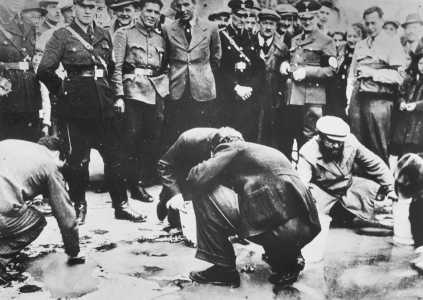Head of Austrian fund for Holocaust reparations visits Institute
Hannah Lessing represents Austrian society’s desire to atone. Her unique job involves, among other things, tracking down Austrian Holocaust survivors or their kin – inside the country and out – to offer financial reparations.
Lessing, the secretary general of the National Fund of the Republic of Austria for Victims of National Socialism, came to USC Shoah Foundation this week to discuss a potential collaborative project with the Institute.
During her stop on Monday, she spoke with the staff about her line of work.
Around the time Lessing landed the job in 1995, she asked her father – a survivor whose mother was murdered in the Holocaust – how the government could compensate. Erich Lessing – a prominent photo-journalist who died last year – refused to answer. When she pressed him, he responded: Can you bring back my childhood? Can you bring back my mother from Auschwitz?
“So knowing I couldn’t, I still wanted to take the job, because those two questions made it so clear: What can we do?” she said during a Q&A with USC Shoah Foundation Finci-Viterbi Executive Director Stephen Smith. “And so this is where it started.”
Austrian society was slow to take responsibility for its role in the Holocaust. For decades after the war, it clung to a victim narrative – and it is true that Hitler forcibly annexed his native Austria in March of 1938 in what was known as Anschluss. But the Wermacht army was greeted with jubilant Austrian crowds, many of the Nazi party’s most prominent leaders were Austrian, and the campaign to seize Jewish property began the day after the takeover.
Tens of thousands of Austrian Jews were murdered in the Holocaust, many at the Mauthausen concentration camp atop a hill in a small Austrian town. Austria’s Jewish population, once north of 200,000, today stands at 10,000.

In 1986, it was revealed that Austrian presidential candidate Kurt Josef Waldman – who won the election – was a former high-ranking SS official.
A few years later, the Austrian chancellor issued a formal apology and acknowledged that many Austrians were culpable.
In 1995, the country began giving reparations to Jews and other targets of the Holocaust. Initially, every survivor or their relatives were awarded a “gesture payment” for the equivalent of about $7,000.
Lessing, who was tapped that year to run the program, immediately made a case to Parliament for traveling outside of the country to find eligible recipients.
“I said, listen, you haven't done anything for 60 years – even the $7,000, that will not make the difference,” she said. “The difference will make it that I travel and … listen (to survivors). And if they need anything, we’re there for them.”
During Monday’s Q&A, Lessing stressed that the reparations aren’t only for Jews.
“It’s a fund which helps all victims groups – even victims groups which for many, many years were not even recognized by the Austrian state as having been victims,” she said. This included deserters, gays, the disabled and the Sinti and Roma – also known as gypsies.
A class-action suit filed in the United States enlarged her budget for a time.
Today, Lessing works with other reparations organizations to find potential recipients around the world – such as Jews of the Kindertransport, who are entitled to 2,500 Euros (about $2,800) from the Conference on Jewish Material Claims Against Germany (also known as the Claims Conference).
The National Fund is also contributing money to memorials, such as a soon-to-be-built Wall of Names in Vienna whose granite slabs will display the names of all 65,000-plus Austrian Jews who died in the Holocaust.
“Finally I can go there and touch my grandmother’s name,” Lessing said.